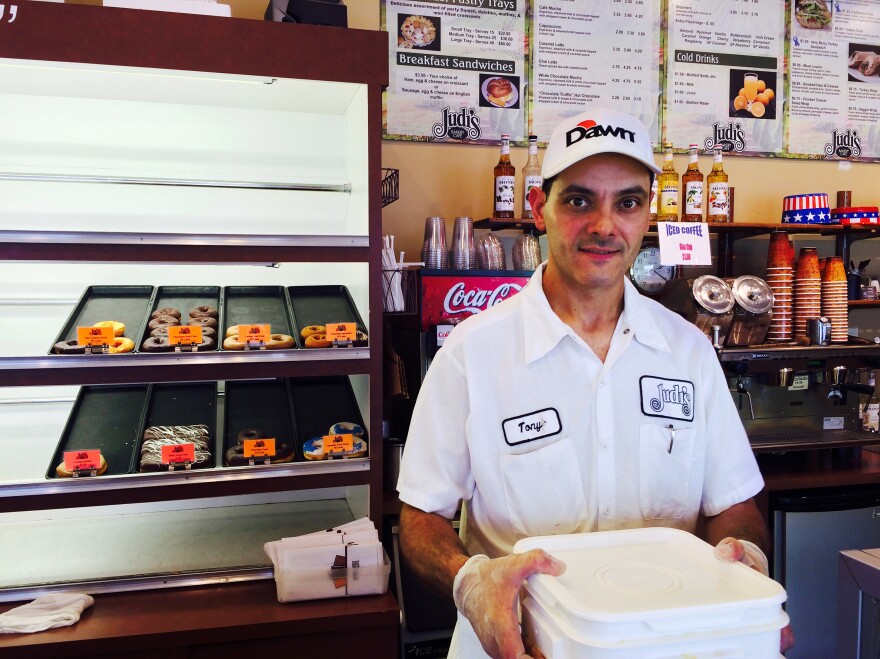Tony Lordi sighs as he reaches into the pocket of his white uniform pants and pulls out his iPhone.
These days, Lordi, the production manager at Judy's Bakery in Kansas City, Mo., checks with his supplier every day. He needs to know the price of what's become liquid gold for commercial bakers: "liquid egg."
"The market's like gas prices at this point," he says.
Rarely heard of outside the food industry, liquid egg is used for dozens of things, from cakes and cookies to mayonnaise and lots of breakfast dishes. On this day, Lordi learns that the price of a 30-pound bucket of liquid egg is $79.24 – more than double what it was in May.
Lordi sighs again – he reads out loud the latest text from his supplier: "He says, 'Very ugly situation headed our way. We ordered 900 buckets of eggs and got 70. They're telling us as of July first, we get zero.' So when my guy that I buy all my eggs from tells me that, what do I do?"
Commercial bakers and restaurants have been hard hit by the shortage of liquid egg, made scarce because of the largest outbreak of avian influenza to ever hit the U.S.
"I think the product is out there. You're just going to have to pay for it," says Brian Moscogiuri, an egg industry analyst with Urner Barry. "That's the bottom line. That's supply and demand."
Liquid egg prices have shot up 240 percent since early May, when the outbreak began spreading quickly across the Midwest, Moscogiuri says. The center of the lethal bird flu outbreak was in Iowa, the country's largest egg-producing state. Most of the 47 million birds killed so far because of the outbreak were part of "breaker" operations, an on-farm process in which chickens lay the eggs, which are then broken, liquefied, frozen or dried.

The outbreak is affecting grocery store shell eggs, too. In some part of the country the price has tripled, with a carton of a dozen peaking at $3. One Texas grocery chain is rationing eggs.
The price spikes come even as agriculture officials believe the outbreak is slowing. On Tuesday, the first turkey farm that was infected got back online in Minnesota. But on Monday, the first case of bird flu was reported in Michigan, with a Canada goose testing positive for the disease.
The outbreak of highly pathogenic H5N2 flu has now spread to 21 states, infecting 298 sites. Scientists watching the spread are surprised at how quickly the virus has moved, especially since it's historically known to be more contagious in the fall.
The outbreak comes at an unfortunate time for the egg industry, which has enjoyed record per capita consumption during the last few years, Moscogiuri says, thanks to popular protein diets.
"Eggs were really becoming the good guy in the protein industry," he says.
Fast-food chains are also taking a hit, just as some are adding or extending breakfast hours. Yet most companies haven't increased prices to compensate, because they have fixed-price menus, says Todd Kuethe, an agricultural economist at the University of Illinois.
"The price of your Egg McMuffin is not going to change, but McDonald's input change on that has gone up considerably in the past month," he says.
A quarter of McDonald's revenue comes from that first meal of the day — business so good that the global chain is testing an all-day breakfast menu. But the outbreak has not affected McDonald's supplies, says company spokeswoman Lisa McComb. She says McDonald's is using its regular suppliers, and its contingency plans are always in place.
"Our ability to provide our customers eggs is not impacted," McComb wrote in an email. "McDonald's is not finding new sources for eggs, nor are we making changes to how we source eggs."
Kuethe and others are optimistic that the worst of the outbreak is over, because the number of bird flu cases has slowed in the last few weeks. Egg prices will likely go down – but not for months, as the flocks are being rebuilt. The infected farms have to sit idle for six weeks after the birds are destroyed, and young hens – called pullets – don't begin laying eggs until they're about five months old.
Supplies are also supposed to grow somewhat from new imports from the Netherlands, which the U.S. Department of Agriculture approved last week. The only other country that imports eggs to the U.S. is Canada, but officials have said they may open up trade to other countries if supplies continue to remain tight.
Peggy Lowe is a reporter forHarvest Public Media, a public radio reporting collaboration that focuses on agriculture and food production. Aversion of this story first appeared on the Harvest site.
Copyright 2021 NPR. To see more, visit https://www.npr.org. 9(MDAxODg3MTg0MDEyMTg2NTY3OTI5YTI3ZA004))




